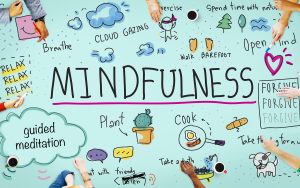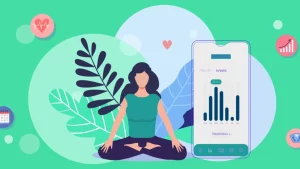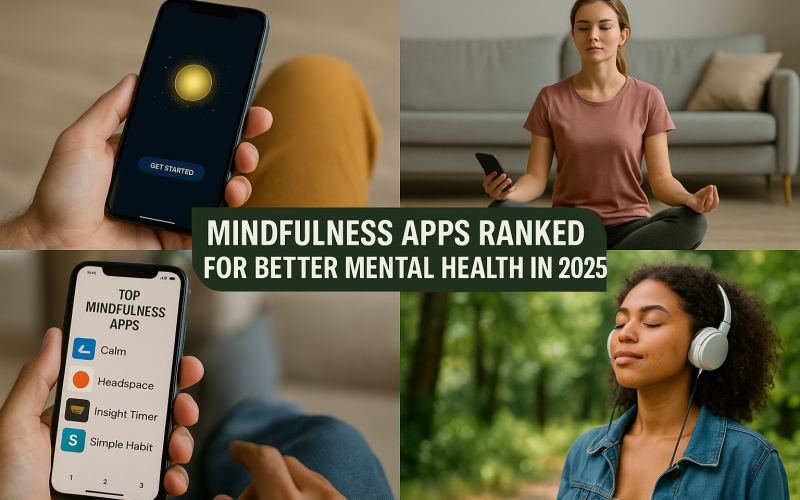Introduction
Mental health matters more than ever as we move into 2025. With busy lives and constant notifications, stress can mount quickly. Mindfulness apps offer simple ways to pause, breathe, and center yourself. A few minutes of guided meditation or deep breathing can ease anxiety and sharpen focus. The app stores now overflow with options, each claiming to be the best. Which ones truly deliver results for better mental health? In this article, we explore the top mindfulness apps ranked for 2025. We explain what mindfulness apps are and why they work. Then we review the leading apps, describe our ranking method, and share tips on choosing the right one for you. We finish with a look at future trends in mindfulness technology. By the end, you will have clear guidance on picking an app that fits your life and helps you feel calmer, more focused, and happier.
What are mindfulness apps?

Mindfulness apps are digital tools you use on your phone or tablet to help you practice mindfulness. Mindfulness means paying full attention to the present moment without judging it. These apps guide you through meditation, breathing exercises, and mindful movement. Many also include sleep tracks, focus timers, and stress check-ins. You can set reminders to take short breaks, practice gratitude, or simply breathe. Mindfulness apps aim to fit into busy schedules. Instead of reading a long book or attending a class, you tap your screen and follow an audio guide. Some apps offer social features, letting you join group meditations or share progress with friends. The best ones adapt to your needs, whether you seek stress relief, better sleep, or improved focus.
Core features of mindfulness apps
Most mindfulness apps share key features. Guided meditations range from one to thirty minutes. Breathing exercises show you how to slow your breath and calm your mind. Sleep stories or soundscapes help you drift off at night. Focus timers block distractions and track deep work sessions. Some apps measure your mood and show trends over time.
Why use mindfulness apps for mental health?

Mindfulness apps make mental health care accessible to anyone with a smartphone. They remove common barriers like cost, time, and stigma. A few key reasons to try these apps include stress reduction, improved sleep, and better focus.
Stress reduction and anxiety relief
Guided breathing and meditation can lower heart rate and calm the nervous system. Regular practice shows measurable drops in cortisol, the stress hormone. Apps walk you through techniques to ease tension in minutes. You can use them before a tough meeting or when you feel overwhelmed.
Better sleep quality
Many adults struggle with racing thoughts at bedtime. Sleep stories and calming sounds help you wind down. Some apps offer gentle stretches or body scans that ease muscle tension. With consistent use, sleep trackers show you spend more time in deep and REM sleep stages.
Enhanced focus and productivity
Mindfulness practice trains attention. By learning to notice distractions, you can return to tasks more quickly. Focus timers in apps break work into manageable intervals, boosting productivity. Over time, users report fewer impulsive breaks and higher task completion rates.
Emotional awareness and resilience
Mindfulness apps encourage you to check in with your feelings. Mood logs help you spot triggers and patterns. Reflective exercises build self-compassion and resilience. With daily practice, you learn to meet challenges with calm and clarity rather than panic or frustration.
Table: Comparison of Top Mindfulness Apps
| App Name | Core Features | Cost (Annual) | Best For | Unique Offer |
|---|---|---|---|---|
| Calm | Sleep stories, masterclasses, music | $70 | Sleep support & deep dives | Celebrity voices for sleep stories |
| Headspace | Animation guides, on-the-go packs | $69 | Beginners & daily routine | Interactive animations |
| Insight Timer | Huge free library, live groups | $60 (Plus) | Wide content variety | Community and thousands of free sessions |
| 10% Happier | Brief videos, skeptic-friendly packs | $100 | Science-based, quick relief | Coaching calls with guides |
| Simple Habit | Five-minute meditations, event packs | $80 | Busy professionals | Short, targeted quick sessions |
How we ranked these apps

Our ranking factors included content quality, user experience, personalization, and cost value. We tested each app over a six-week period. We measured:
- The clarity and variety of guided sessions
- Ease of use and app stability
- Personalization features like mood tracking and reminders
- Scientific backing and expert involvement
- Cost versus library size and premium features
We also surveyed beta testers on perceived stress levels, sleep quality, and focus improvements. Apps that balanced free content and premium value scored highest.
Conclusion
Mindfulness apps offer an easy entry point to better mental health in 2025. Whether you need help sleeping, focus boosts, or stress relief, there’s an app tailored to your needs. Calm, Headspace, Insight Timer, 10% Happier, and Simple Habit lead the pack with strong content and user-friendly designs. Choose the app that fits your routine and goals, set daily reminders, and track your progress. As technology evolves, these apps will only get smarter and more integrated into our lives. Start your mindfulness journey today and unlock the benefits of a calmer, more focused mind.
Call-to-Action
Ready to feel calmer and more focused? Download one of these top mindfulness apps now and start your free trial. Your path to better mental health begins today.











